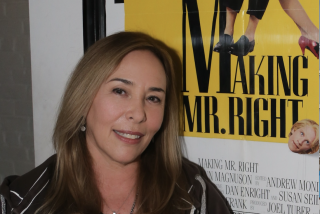Don’t freak out #151; it’s killer Kaufman
Scriptland, launching today, is a new weekly feature on the work and professional lives of screenwriters.
*I have the new Charlie Kaufman screenplay on my desk.
I’ve read it — no, lived it. I’ve been moved and astounded by it. And I’m tortured by the dilemma of what I should or should not say about it here. I feel a bit like Frodo palming the One Ring.
The last two weeks have been a grueling cacophony of real and imagined voices — other journalists, producers, publicists, Kaufman, myself — trying to convince me either of my righteousness as a journalist or of my complicity in possibly hurting one of the greatest screenwriters in history, a man with a craving for privacy as singular and passionate as his creative vision.
Kaufman is widely and justifiably considered the most inventive screenwriter in Hollywood. He was nominated for an Oscar for both “Being John Malkovich” and “Adaptation,” and finally won one (along with Michel Gondry and Pierre Bismuth) for “Eternal Sunshine of the Spotless Mind.”
On a personal and professional level, I thought reading his latest script would bring me great joy. Charlie Kaufman is that rare artist who expands the possibilities of his art form. His work is designed to be experienced more than read or seen. His filmed screenplays become beautifully melancholy windows into some of life’s most indescribable (and unavoidable) emotions.
But many people, beginning with Kaufman, do not want me to have the script, do not want me to read the script, and without question do not want me to write anything about the script. Words like “super-sensitive,” “invasive” and “freaked” have been cautiously leveled at me as I’ve reached out to those involved with the project to get their thoughts on it.
And what a project. Ambitious doesn’t even begin to describe the sublime and scary head-trip that is “Synecdoche, New York.” For one thing, the marketers are going to have to borrow from the P.T. Anderson “Magnolia” poster campaign, in which the title was broken out syllabically, just to get people to pronounce the film properly. (It’s sin-neck-duh-key, emphasis on the neck.)
For all those who aren’t AP English professors, a “synecdoche,” other than a clever play on Schenectady, where some of the film takes place, is a figure of speech in which a part is used to describe the whole or the whole is used to describe a part (think “threads” for clothes, or “the law” for a police officer). It’s representative shorthand.
Yes, I had to look it up. Several times. And this is far from the only reference or play on words in Kaufman’s story that rewards a closer look.
“Synecdoche” nominally concerns a theater director who thinks he’s dying, and how that shapes his interactions with the world, his art and the women in his life. But it is really a wrenching, searching, metaphysical epic that somehow manages to be universal in an extremely personal way. It’s about death and sex and the vomit-, poop-, urine- and blood-smeared mess that life becomes physiologically, emotionally and spiritually (Page 1 features a 4-year-old girl having her butt wiped). It reliably contains Kaufman’s wondrous visual inventions, complicated characters, idiosyncratic conversations and delightful plot designs, but its collective impact will kick the wind out of you.
Spike Jonze, who directed Kaufman’s scripts for “Malkovich” and “Adaptation,” was once destined to helm this new project, but eventually opted for the Dave Eggers co-scripted “Where the Wild Things Are,” now shooting in Melbourne, Australia. This left Kaufman, who’s always been deeply involved with the making of his screenplays, to direct it himself. He’s currently finalizing casting deals with an eye toward filming next spring.
If this film gets made in any way that resembles what’s on the page — and with the writer himself directing, it will likely gain even more color and potency in the translation — it will be some kind of miracle. “Synecdoche” will make “Adaptation” and “Eternal Sunshine” look like instructional industrial films. No one has ever written a screenplay like this. It’s questionable whether cinema is even capable of handling the thematic, tonal and narrative weight of a story this ambitious.
But, as one character says, “People starve for something of worth.” Well, moviegoers will surely be gorging on the power and depth of this film for a long time.
Meanwhile, I feel terribly sick to my stomach.
Going inside the situation room
While television docudramas on the terrorist attacks of 9/11 flood network TV on its fifth anniversary, development slowly moves forward on one of the most anticipated and potentially controversial projects about those traumatic events — the adaptation of White House counterterrorism expert Richard A. Clarke’s bestselling “Against All Enemies: Inside America’s War on Terror.” Screenwriter James Vanderbilt (who also wrote the script for the real life-derived, David Fincher-directed thriller “Zodiac,” coming next year) tackled the massive job of condensing 30 years of behind-the-scenes insider American foreign policy — as seen through Clarke’s eyes — into 200 crackling script pages.The screenplay jumps from a minute-by-minute rendering of the activity in the White House Situation Room on that fateful morning back to Clarke’s early years in the State Department on the eve of the Soviets’ invasion of Afghanistan in 1979. From there, Vanderbilt’s script hopscotches around the world’s hot spots and through the relevant events of the era as it traces the daisy chain of policy decisions, and their intended and unintended consequences, leading up to 9/11. (The writer also gifts quite a few career bureaucrats with snappy one-liners).
“Enemies” is all political context and attempts to take in the whole of the American government — it includes appearances by powerful living figures such as Presidents George W. Bush and Bill Clinton, Dick Cheney, Condoleezza Rice, assorted diplomats, government employees, military brass, world leaders and spooks.
At the moment, the film looks to be Oscar-winning writer Paul Haggis’ directing follow-up to his best picture-winning “Crash,” with Vince Vaughn and Sean Penn having been floated as possible leads. Sony is in the process of vetting the script for potential legal and intellectual property issues. Whoever got that assignment surely deserves a raise.
Scorsese tackles southies, sex toys
Critics and moviegoers alike are eager to see Martin Scorsese’s “The Departed,” a remake of the popular 2002 Hong Kong cops-and-gangsters drama “Infernal Affairs,” written by Siu Fai Mak and Felix Chong. Transplanted to Boston, the coiled plot follows two young cops — one undercover with the mob (Leonardo DiCaprio), one working for the mob from inside the force (Matt Damon) — and their relationships with Costello, a Mafia-kingpin father figure played by Jack Nicholson.The screenplay, by William Monahan (“Kingdom of Heaven”), is steeped in Boston’s geography and history, its class grudges and casual racism. The dialogue churns with the authentic crudity of blue-collar cops and criminals beating their way to different types of justice, though some of the regional patois comes off a little insular to non-native ears (“southie,” “staties,” “three-decker”; Monahan even slips in a “numbas” just to make sure no one misses the Beantown dropped-”r” lilt).
The story has the kind of cold elegance, spasms of brutal violence and split loyalties that are so ripe for Scorsese’s psychologically precise touch. But the script I have is only the backbone of the story, because the director apparently encouraged and used a significant amount of improv during filming.
This openness led to a scenario that has become infamous since last summer, when it was filmed. Nicholson brought some verisimilitude to a sex scene that he tweaked himself the day before shooting in which Costello cavorts with two prostitutes and finds a very original sexual use for cocaine. The studio has recently tested the film both with and without the scene. Amazingly, this integral plot development has remained in Scorsese’s cut despite the fact that scores rise when audiences see the film without the sex-toy shenanigans. Even more amazingly, the studio thus far is leaving the final decision up to the director (which must be giving Alan Horn, who tries to purge smoking from Warner Bros. movies, the night shivers). However it plays out, this is what DVD audio commentaries were made for.
Scriptland appears Wednesdays in Calendar. Comments, tips, and screenwriter sightings can be sent to fernandez_jay@ hotmail.com.
More to Read
The biggest entertainment stories
Get our big stories about Hollywood, film, television, music, arts, culture and more right in your inbox as soon as they publish.
You may occasionally receive promotional content from the Los Angeles Times.










